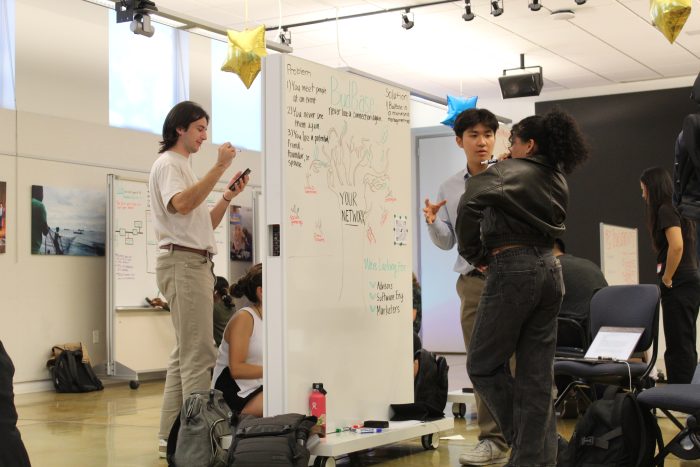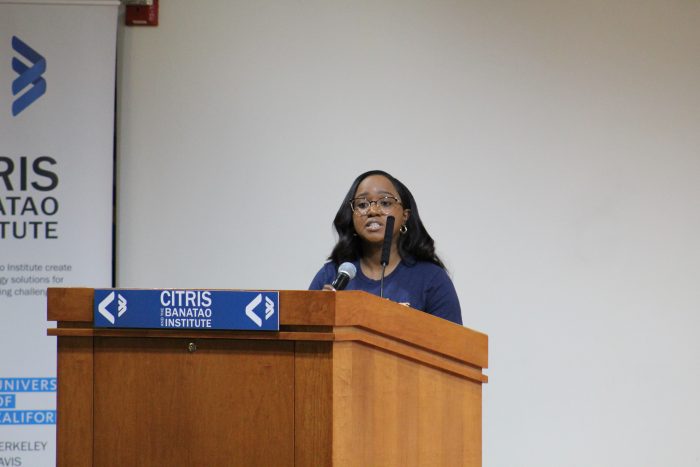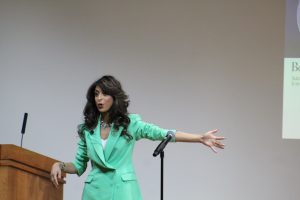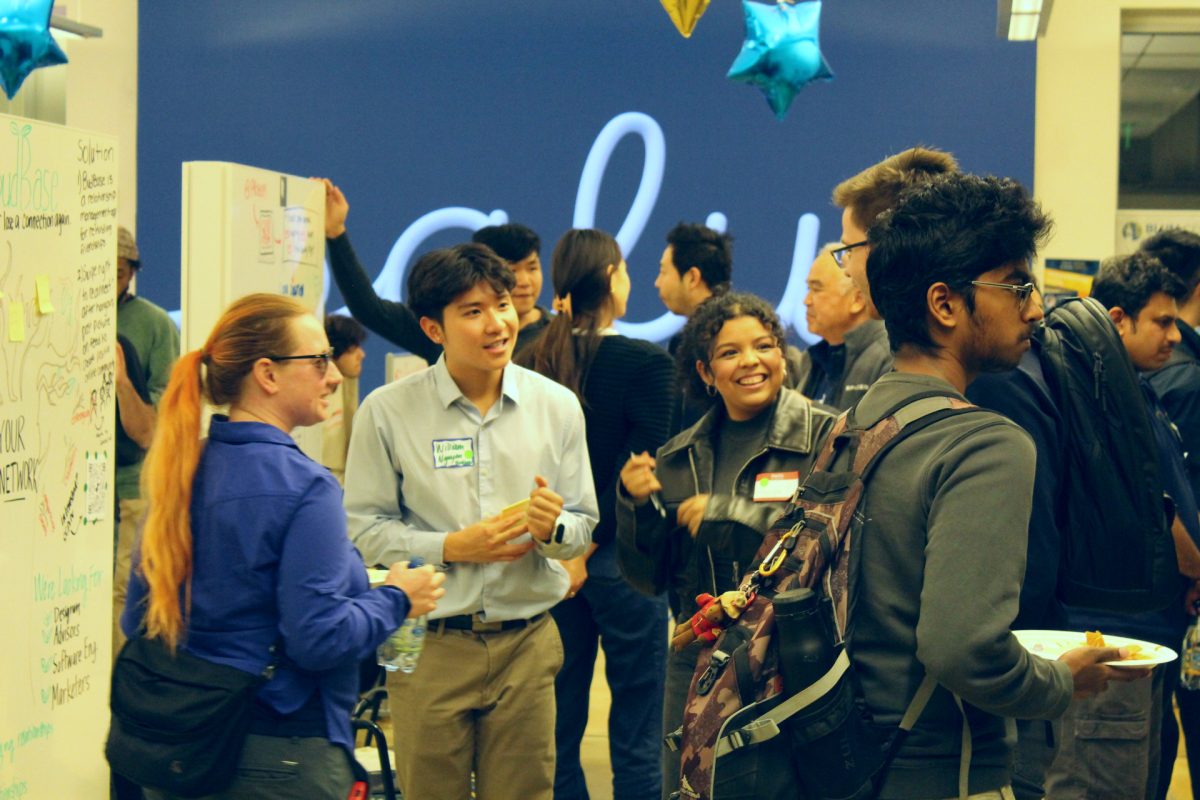Earlier this fall, UC Berkeley debuted a webpage spotlighting the breadth and depth of its most innovative alumni and the resources available on campus to support the next generation of game-changing entrepreneurs, along with a series of deep-dive stories highlighting Cal founders and their impacts on society.
The timing couldn’t have been better: Pitchbook recently ranked Berkeley No. 1 for number of venture-backed startup companies, ahead of the likes of Stanford, Harvard, Penn, and MIT. Berkeley innovators like Jennifer Doudna and Kevin Chou generate international headlines. Campus is home to an ever-growing number of entrepreneurship, innovation, and tech-minded organizations and resources.
But — for the aspiring student innovator with a rapidly germinating new idea — where do they start? Where can they access resources and support to help transform their ideas into reality? Where can they find teammates ready to go all-in?
On November 7, that place was Innovators@Cal — UC Berkeley’s annual flagship entrepreneurship event, which brought together aspiring student innovators, students curious about joining early-stage ventures, and an inspirational keynote speaker tackling the “world’s dumbest problem.”
Students from a wide range of disciplines and departments across the UC Berkeley campus took turns offering two-minute pitches to a standing room–only crowd in Banatao Auditorium. They highlighted a wide range of innovations, including an app detecting stroke symptoms, an electrical grid–monitoring technology, and simple new methods for improving the availability of menstrual products. Immediately after, speakers and listeners alike gathered in Blum Hall for a lively networking and brainstorming session where students used whiteboards to sketch out their ideas, solicit feedback, and find teammates.

One of those blueprints was for the startup Materri, which generates recommendations for the best materials to use in footwear designers’ products, saving those producers time and money in consulting fees. Materri attended Innovators@Cal hoping to recruit software engineers.
“We’re not software engineers, and we’re building a software platform,” said co-founder Kira Erickson. “So that’s been our main hurdle in becoming a successful startup: just finding engineering talent, so we’re hoping to find some talented people to work with us.”
Across the room was Kerisha Burke, who, after researching why Black people hold a disproportionately low percentage of STEM jobs, found that part of the problem was rooted in student opportunities. “Students from underrepresented backgrounds continue to face challenges in pursuing careers in the STEM industry,” she had told the audience, “particularly due to the lack of access to resources that could help them to succeed.” Many of these resources exist outside the classroom — STEM conferences key among them. But these events are expensive to attend and time-consuming to apply for.

Enter Burke’s Scholarly Loop, an AI-powered platform consolidating all manner of resources to support underrepresented students throughout the entire conference process, from a list of conferences to travel scholarships to tools that facilitate the paperwork side.
“I’ve been looking for an opportunity to pitch,” she said. “And I thought this was an opportunity for me to be vulnerable, open, and to just take a risk. Hopefully this is the first step in me doing that, then going out there and pitching and just getting more comfortable with sharing my ideas with others.”
The event was sponsored by a host of on-campus organizations, including many student-run, spanning the innovation and entrepreneurial pipeline: Sutardja Center for Entrepreneurship & Technology, AI Entrepreneurs at Berkeley, CITRIS and the Banatao Institute, Berkeley Venture Capital, Entrepreneurs@Berkeley, Entrepreneurship@BerkeleyHaas, NSF I-Corps, the Student Entrepreneurship Program, and the Big Ideas Contest, Berkeley’s flagship social-innovation competition (pre-proposals applications are due December 6).
The night’s guest of honor was keynote speaker Komal Ahmad, founder of Copia, a logistics technology platform for managing food waste. Ahmad, winner of the 2012 Big Ideas Contest, studied international health and global development as well as Global Poverty and Practice at UC Berkeley, before her work solving hunger earned her an avalanche of accolades, including landing on Forbes’ 30 Under 30 list. Copia redirects leftover food and meals (including from the Super Bowl and the Oscars) to organizations and people who need it now. The company has saved over 6.5 million tons of food, delivered over 5.4 million meals, generated over $21 million in savings for businesses and nonprofits, and operates in 40 states.
The story behind those eye-popping numbers is a single meal that an undergraduate Ahmad, then studying to be a doctor, hadn’t intended to have.

Walking down Telegraph Avenue, she encountered a homeless man asking for food, and she invited him to join her for lunch. As he wolfed down his meal, he shared his story: His name was John and he had returned from his second tour in Iraq to find that his military benefits hadn’t kicked in. He hadn’t eaten in three days. And yet, “right across the street,” Ahmad said, “Berkeley’s dining hall was throwing away thousands of pounds of perfectly edible food.”
Hunger was not a problem of insufficient food, she realized, but a logistics and distribution problem.
“Solving the world’s dumbest problem became my life’s mission and Copia’s purpose,” she said. “Had I never reached out to that homeless veteran, had I never looked up from my phone, Copia would not exist. That day I fed one man. Because of his story, Copia will feed 8 million people” this year.
Yet the journey from one to 8 million was anything but linear.
Ahmad’s first attempt to find new stomachs for 500 leftover sandwiches on short notice had hardly any takers. Fast forward to subsequent efforts where she recruited her own volunteer drivers to ferry food from A to B, then tapped into the existing infrastructure of Doordash and Postmates to scale her endeavor. But after three years, Copia had yet to make much of a splash locally, and Ahmad felt depleted. “I lost my passion,” she said. “I lost my fire.”
She took a job at Google, listening to the complaints of angry customers for six months before getting fired. She had hit “rock bottom.”
But her dismissal was the “best thing that ever happened to me.” The intensity of failure, she told students, provides one with a new clarity, allows one’s strengths to shine through, and one’s “genuine self emerges.”
Ahmad returned to her passion, first volunteering at a Silicon Valley food pantry and then recruiting more volunteers. She built the technology and logistical systems to connect all manner of businesses and nonprofits so that leftover meals can find recipients who need them now. Copia joined the prestigious Y Combinator accelerator and became a multimillion-dollar startup.
“It’s not an overnight transformation,” she said. “It’s taking this step over and over — to take the risk, chase the dream, and follow your heart.”
“Whatever comes your way,” she advised, “keep moving forward.”
That, in a nutshell, is one of the key attributes of a successful entrepreneur, and a life view that UC Berkeley inspires, teaches, and supports. So remember to get your Big Ideas proposal in by December 6 — take a cue from Komal and take that risk. We are here to support you!
